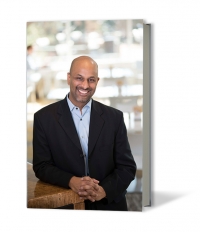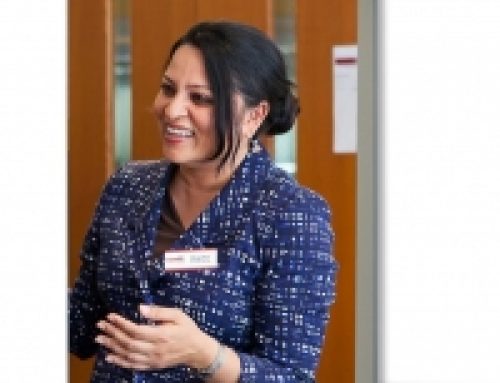Apoorva Gandhi NetIP (Network of Indian Professionals) Interview – The Intersection of Indian Culture and Hospitality Industry
NetIP Spotlight: Live Your Potential is a monthly show featuring experts on trending topics.
“The Intersection of Indian Culture and the Hospitality Industry”
Jasbina Ahluwalia interviews Apoorva Gandhi
Jasbina interviews Apoorva Gandhi, VP, Multicultural Affairs, Marriott International
Apoorva will discuss the following topics:
-
Aspects of the Indian culture that are gaining popularity in the hospitality industry
-
Ways in which Indian Americans can utilize Marriott facilities for professional, social, cultural and personal reasons
-
Types of experiences vital to succeeding as a Marriott branded hotel owner
As Vice President for Multi-Cultural Affairs for Marriott International, Apoorva Gandhi is responsible for creating and executing an externally-focused global strategy that builds preference and loyalty from diverse customer segments for the Marriott portfolio of brands.
He helps ensure the company’s marketing, sales and operations consider and reflect multi-cultural markets and alliances as Marriott continues its aggressive growth throughout the world.
Mr. Gandhi has nearly 20 years of proven strategy, business process, program management and organizational change skills, leadership and delivery expertise. He also has extensive management and delivery experience working with diverse business clients and a solid track record delivering measurable success to clients across various business disciplines.
Prior to his current position, Mr. Gandhi was senior director for organizational capability where he led the company’s global reorganization program in Europe, the Middle East, Africa and Asia. He has held other positions with Marriott, beginning as a front desk associate when he first completed college. He also worked as vice president for global lodging services where he helped deliver critical brand initiatives.
Before joining Marriott, Mr. Gandhi was a senior consulting manager in Accenture’s Communications and High Tech practice for more than a decade, where he managed merger and integration programs as well as process reengineering efforts for large telecom clients. He also led diversity programs at Accenture.
(00:48): Hello everyone. Welcome to NetIP Spotlight: Live Your Potential where we invite guest experts to speak on a variety of trending topics that matter to you. I’m Jasbina Ahluwalia, your host. I want to warmly welcome you to our show this evening.
I know everyone is crazy busy these days. I appreciate your investing time and joining us this evening. To give you a lay of the land, our guest speaker and I will be discussing his insights for about 20 minutes. After the discussion, you’ll have the opportunity to ask him any questions that you might have. With that said, let’s jump in.
Today’s guest speaker is Apoorva Gandhi, Vice President for Multicultural Affairs for Marriott International. Prior to his current position, Apoorva led the company’s Global View Reorganization program in Europe, the Middle East, Africa and Asia. He has held other positions with Marriott beginning as a front desk associate when he first completed college. He also worked as Vice President for global lodging services where he helped deliver critical brand initiatives.
Before joining Marriott, Apoorva was Senior Consulting Manager at Accenture’s Communications and High Tech practice for more than a decade where he managed merger and integration programs as well as process reengineering efforts for large telecom clients. He also led diversity programs at Accenture. Welcome to the show, Apoorva.
Apoorva Gandhi
(2:16): Thank you. It’s great to be here.
(2:19): It’s great to have you. I understand that aspects of the Indian culture are gaining popularity in the hospitality industry. Can you tell us about that?
Apoorva Gandhi
(2:32): First, I want to thank everyone for joining us. I want to thank the NetIP team for inviting me to come and speak. I love this organization. I applaud all of you for really taking on this important task of keeping our culture vibrant and providing great professional development for all of the members and others. I think it’s a really important thing. Kudos to all of you.
We are seeing a lot of demand and interest regarding Indian culture and Indian events at our hotels. This starts off with probably the most fun thing, which are Indian weddings. We are seeing such great demand from our properties that want to learn as much as they can to help deliver the best and most auspicious wedding that they can. I think back to my wedding. We had 700 people at our wedding. It was huge. There is a reason why I’m bald, trying to plan that thing.
It’s a great source of business for us. It’s also a great way for us to continue to communicate the fact that we welcome everyone in our hotels. We welcome folks from all walks of life. We’re dedicated toward making sure that, whether you’re coming to us for a leisure trip, a business trip or a grand Indian wedding, we will treat everyone with respect and dignity.
More importantly, we will do so with cultural competence. We want to make sure that we know all the different steps of an Indian wedding. We know the differences between North Indian food and South Indian food, whether it’s a Gujarati style wedding or a Punjabi wedding. We want to make sure that our sales team and folks on site know. We have multiple events.
They should know what a Mehndi party is. They should know what the Sangeeta is. They should know what the Vada is. They should be prepared that they will need to have a fire. There might be a horse or an elephant delivering the groom. We really spend a lot of time immersing our team in the culture. It’s a great piece of business.
When we talk with our catering and sales associates, they love Indian weddings probably the most out of any of the events that they do. They find them to be the most vibrant and fun. In fact, we do this thing called India Culture Days. Myself and a member of my team present to teams of catering leaders. We take them through the ABCs of the Indian culture in terms of the country, demographics and some of our approaches to life. Then we go on a field trip. Depending on what city we’re in, we’ll go to the Little India section. We’ll have an Indian lunch. The chef there will talk to them about the food and how they prepare it. They will show them vegetarian dishes versus non-vegetarian.
Also, we’ll go to a sari shop. Folks will try on saris and different outfits. I live in Washington, DC. The Gaylord National Harbor Hotel does a lot of Indian weddings. Their team happens to be all ladies. They all bought saris. They said that, when it came time for the wedding, they wanted to be dressed in saris as a way of making a bond with the customers. The customers loved it. They loved it because they felt like they were part of it. They were absolutely gorgeous.
Our Marriott team is really proud of this opportunity. We have to continue to understand, whether it’s Indian weddings, quinceanera celebrations or bar mitzvahs, all of these different events are really important to our business as we’re seeing the changing demographics of the United States. We have to understand that these events are new opportunities for us to build different revenue streams that are going to become the major revenue streams.
If we don’t get that and understand it, our competition will. This is a huge opportunity for Indians in particular. It’s something that we’re really excited about. It’s not just in the big cities in the United States. We’re now seeing destination Indian weddings. We’ve been getting requests from the Caribbean and Latin America. We just did a big webinar with our JW Marriott Cancun team. They wanted to get ahead of the game with Indian weddings. Many folks are opting to do them as a getaway. They have a beautiful location. It’s really exciting to see.
(8:10): That gives a lot of flavor, between the different regions and cultural backdrop. Between those field trips to Little India throughout the country as well as the weddings, do you have any funny anecdotes from any of those experiences?
Apoorva Gandhi
(4:44): Yes. You know how we Indians are. We’re always full of life. In addition to these Indian weddings, we also get a lot of Indian business travelers. Many come over here from India for extended stays. They may come for six months of IT training or call center training. We had a group that came over to the Chicago area for about six months. They were a group of 15. It was funny.
This property was a Residence Inn in Chicago. Those are the hotels where every room is like a big suite. It has a kitchen. We put together a program for them. When they arrived, we would have a welcome back Indian snack. When they got here after their long journey, the first thing they would see would be snacks that reminded them of home. We would add a $5 phone card so that they could call home and tell family that they arrived okay.
We would serve Indian breakfast in the morning. We would do an India night once a month. We would show Bollywood movies and stream the hotel in saris. One of the things that we did on the weekend was that we would have our little shuttle bus. At 10:00, everyone would get on the bus. We would drop everyone off at the Little India section in Chicago on Devon Avenue.
Folks would hang out for four or five hours, have lunch and go grocery shopping. Many of them would want to cook in their own rooms. Then we would pick them up at a certain time and bring them back. No one was on time. Our property learned the importance of IST, Indian Standard Time. After the third or fourth time we did this, it became a party bus.
The staff would play Bollywood music on the DVD player. They would show movies. It became a party bus. People would bring snacks and drinks. In some cases, people would be dancing on the bus. We noticed that, at some point, there were folks on the bus who had no intention of shopping or cooking. They just wanted to come for the fun of it.
(11:46): That’s great. I thought you were going to say that there were some people who were not even associated with Marriott, they just got on the bus because it was so much fun.
Apoorva Gandhi
(11:57): No. It was so much fun. When I heard about this program, I sent a photographer over there to take pictures of it. It was supposed to be at 7:00. I got this phone call at 7:30 or 8:00. He said, “There are a ton of people here but none of them are Indian.” The non-Indians loved it just as much as the Indians. They loved all the food and fun. We had mehndi artists there. They were getting that done. It was a blast. I told him, “Hang on. Don’t worry. Just wait another hour. The Indians will be there. They’ll be late. They will also be the last to leave. Don’t worry.” We have a lot of fun with it.
(12:51): This sounds like so much fun, this multicultural role. Do you have any guidance for our listeners who are thinking, “That might be something I would be interested in for the future?” If someone has an interest in a similar role in multicultural affairs, what guidance might you have?
Apoorva Gandhi
(13:15): Before that, I’ll tell you a funny story. I’m a strategy consultant by trade. I’ve done a lot of different things at Accenture and Marriott that were not related to this kind of work. When I took this role in Multicultural Affairs, my wife said, “Apoorva, what kind of job is this? It sounds very exotic, like you’re going to travel the world and have multicultural affairs.” I teased her. I said, “Don’t worry. That’s just what they call it. You know honey, if it was 20 years ago and we were still single, it might be another story.”
I got very lucky. I had always done what I would call “diversity work” as an extracurricular activity. I had a day job doing strict strategy consulting. My night job was putting together diversity mentoring programs at Accenture and serving on different committees at Marriott to really ensure that where I was working had respect, dignity and inclusion for everyone, whether you worked for us, were a supplier for us or came to stay as a guest in our hotels. I did it as an extracurricular. I was recommended for this role. You really need to have a passion for it. At times, it sounds a lot more glamorous than it actually is. It’s a great job. It’s a lot of fun. There are some days where you feel you continually have to keep on selling the value of this work.
You have to keep convincing folks that the demographics of the country are changing. The source markets for our business around the globe are different now. You have the Indian middle class, which is 400 million people who now have money and want to travel places. That’s bigger than the whole United States. There are a lot of people out there who don’t want to get that.
They still believe that we’re back in the 50s and, if we continue to focus on the Boomers and over 50 male Caucasian business person, then everything will be just fine. The reality is that the demographics are changing. A lot of my job is helping people understand that things are changing in big ways. All you have to do is show the census. You can see the growth of that. There are Asians and LGBT markets. It’s really about being able to quantify the business value of that. Stick to your guns.
Your question was, “How does one get into this work?” I don’t think you can say, “Yes, I like diversity. It sounds really cool.” It’s not really like that. You have to understand a bit of the science behind it. You need to understand that there are a lot of different ways to speak about diversity. A lot of folks say, “Isn’t this just about finding out how we’re all the same? We should all get along. It’s nice to be nice. Isn’t that cute.” Really, it’s not like that.
It’s about finding out how we’re different and figuring out how to celebrate those differences and use it to get business results. In the boardroom, talking about diversity can be very hard. It’s about drawing that link to dollars and cents. If you can’t do that then it’s not really a good role for you. In business today, everything has to show value immediately or very quickly. It’s not as easy as you might think.
As much as the country progresses, we evolve and make changes, it’s still an uphill battle in many ways. If you look at the boardrooms of America, the number of Asian entrepreneurs and CEOs compared to board level appointments, the numbers are off. We should have so many more Asians in corporate boards. We should have so many more Asian Indians in corporate boards. We are the most successful demographic in the United States. Everyone should know that. People listening to this should have their facts ready.
There is no question that Asian Indians are the most successful demographic. The average per capita income is about $86,000 a year, which is much higher than any other demographic in the United States. You sometimes have to school people on the facts. It’s a lot of continual education. It’s education of people who may not want to hear it. That can wear you out. It’s not for the meek-hearted. It’s not for the shy. It’s not for the “can we all just get along” people. It’s really about the science of diversity.
(18:40): That’s very interesting. Speaking of business value, do you have guidance for our listeners who might be thinking, “I like what Marriott is doing here?” You’re really capitalizing on some of the demographic trends that you just mentioned. Some of our listeners might have an interest in acquiring or investing in a Marriott branded hotel. What types of experiences do you think are vital in succeeding as a branded Marriott hotel owner?
Apoorva Gandhi
(19:13): In my travels in my corporate career, there are many places where I feel like a minority because of the demographic of the room. One place in the world where I’m probably not a minority is when I talk with hotel owners. There, I am part of the majority, which is a great feeling. I can roll in and say whatever I think, and everyone agrees with me all the time. It’s great.
All kidding aside, the good news is, for Indians in particular, it’s very much in the blood. We are great entrepreneurs. It’s not just a stereotype. It’s true. If you look at the demographics in the United States, it shows our success as a culture here. The business environment and entrepreneurship that happens in India is amazing as well.
Here are a couple of things for folks who are interested in getting involved in hotel ownership. We host something called a Diversity Ownership seminar a couple of times a year. At Marriott, it’s very important to us that we have a great pipeline of diverse owners. We have a program around that and we’re very proud of our commitment. We want to have folks who own our hotels in the community who represent that community. It’s really critical to us.
We host these things called “So you want to own a hotel 101.” We talk about what it means to own a hotel. What’s the capital outlay? How does the process work? We demystify it a bit. With Indians, it doesn’t take much to demystify it because there are so many Indians already involved in our business. With other cultures, we do need to spend time to help people understand. It’s not easy, but it’s not such an insurmountable thing.
What we look for are folks who have that entrepreneurial attitude. A lot of times, we’re not the first business that they have. Many times, these are folks who already own a Dunkin Donuts, Subway or a frozen yogurt business. Maybe they’ve done pretty well. Maybe they’re looking to do something different. Maybe they want to get to the next level of entrepreneurship and being their own boss.
We find that we might be their second or third entrepreneurial venture. It’s not easy. People may have the capital or we show them ways that they can get the capital to get started. They may start off with one of our brands like Fairfield Inn & Suites or TownePlace Suites. They are our select service brands, which are mostly franchised. They can go at it from that perspective.
We’re looking for people who have a good track record. We are a great brand. Our returns for our owners are fantastic. Everyone who has been in a hotel knows that it’s a lot of work. We Indians are used to it. It’s about having that entrepreneurial attitude. That’s what we look for.
(23:03): I’m switching from the perspective of the owners back to the consumers. What are some of the ways in which Indian Americans can utilize Marriott facilities for professional, social, cultural or personal reasons apart from weddings?
Apoorva Gandhi
(23:24): If any of you were at the last NetIP Conference in Atlanta, perhaps we met. I was one of the judges at the competition. If you were there, we showed a quick video and gave out coupon codes for something that we’re pretty psyched about. It is something called Workspace on Demand. We know that there are a lot of entrepreneurs in our community.
Many work out of the house. Many work in somewhat cramped offices. Some work in their basements or garages. We know that, at times, you may want to have more of a professional setting or you want to impress a client. You might just want to have a nice, quiet meeting somewhere. With Workspace on Demand, you can get online and reserve a table in one of our lobbies or a private conference room in one of our hotels.
There is no contract involved. Let’s say that tomorrow at 10:00 AM you said, “I want to book an afternoon meeting retreat with my team.” You can get online, search where you want to meet and, at 2:00 PM, book a table. You get to that hotel. I think our hotels are nice, have nice lobbies and are very professional. When you get there, the table will have a sign that says, “Reserved for Workspace on Demand Client.” It will probably have your name on it.
You will have a nice, professional setting with Wi-Fi and supplies if you need them. Depending on the hotel, someone will come around to take a lunch order or get you a round of drinks. It’s a nice way to get that professional environment office look and feel when you need it. We don’t want to pay for stuff if we don’t need it. But we will pay for it if we do need it. It’s a way of giving that storefront image.
We talked a bit about Indian weddings and celebrations. That’s certainly something that we can work with you on. Also, you can have other general events at our hotels. For instance, I was in Mexico recently in Puerto Vallarta for a meeting. When I walked in the door, they were celebrating Tastes of India week.
They brought in the chef from the Renaissance in Mumbai. They draped one of their restaurants in Indian imagery, played Bollywood music and served Indian food just because. I talked to the general manager. He said, “We’ve been doing this for two weeks. Everyone absolutely loves it.” You never know when you’re going to stumble on some surprises like that.
Some of our concierge lounges will serve ethnic snacks. I was just up in Baltimore at one of our Marriotts. They happened to have samosas there. I said, “What a nice surprise.” Many of our hotels will have Indian food on their menu. Not all of them, but some of them do. We have great food in our culture and many love it. We are really happy to provide those opportunities.
(35:04): In case you joined us late or if you’d like to share this show with people in your life, a recording of this show will be sent out. I appreciate everyone hanging out with us. Make sure to join us for next month’s show. Take care, everyone.
_____
What do you think?
Would you like to add to the insights shared in the Apoorva Gandhi interview? Share your thoughts in the comments below.
_____





